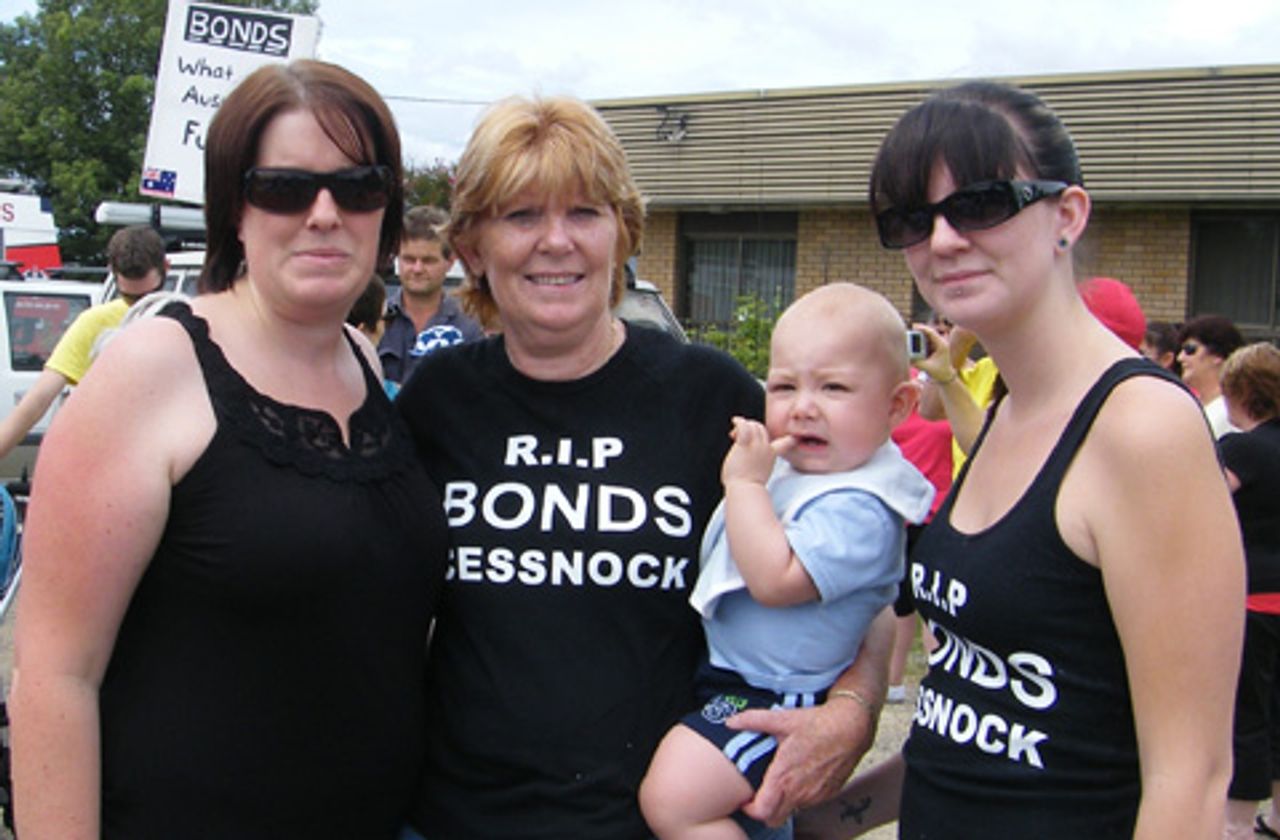Speeches by union officials at a lunchtime rally of about 200 people outside the Pacific Brands factory, formerly Bonds, at Cessnock, north of Sydney, last Friday confirmed that the Textile Clothing and Footwear Union (TCFU) has no intention of fighting the plant closures announced by the company in February.
The Cessnock rally was the last of a series of meetings called in Melbourne, Sydney and Wollongong, not to initiate a broad campaign to defend jobs, but to stifle any independent initiative by workers. The union is engaged in closed-door talks with the federal Labor government and the company to smooth the way for "orderly closures".
Recognising that the union has accepted the plant closures as a fait accompli, many Bonds workers wore t-shirts made in the factory bearing the slogan "R.I.P. Bonds Cessnock". Ten factories are to be closed in Australia, New Zealand and China with the loss of 2,800 jobs.
The main thrust of the union speeches was economic nationalism, urging workers to demand "no more Aussie jobs to go overseas" and to back the union's protectionist call for all government clothing to be made in Australia. TCFU national president Barry Tupner added his own racist slur: "It would not be the same if Chesty Bond [the company's marketing symbol] spoke with a Chinese accent".
No mention was made of the company's plans to shut its Chinese plant at the cost of 850 jobs. The New Zealand closures were hardly referred to. No reference was made to the fact that the closures had been dictated by the same major Australian banks that the Rudd government has been bailing out.
The purpose of the union's protectionist demands is to derail any unified international struggle against the company to protect jobs, wages and conditions. The program of economic nationalism, which lines workers in one country up behind their "own" companies and pits them against workers overseas, has already led to the destruction of tens of thousands of clothing industry jobs.
Union officials acknowledged that talks had produced nothing for workers. The company has rejected government aid and union offers of further sacrifice by workers. As far as the management is concerned, continuing operations in Australia are "not part of the equation".
The other TCFU demands voiced at the rally were all predicated on accepting the closures. The union has urged the company to protect workers' entitlements by placing the money into a trust fund. However, Tupner admitted that the company had already ruled out a trust fund as not "good business practice" because it would tie up millions of dollars in working capital. The management's stand is an ominous sign that, as in many other closures, money owed to workers will not be paid in full or necessarily at all.
There is also no guarantee that the Rudd government will meet the union's limited demand to exempt displaced workers from the assets test for unemployment benefits. To do so would open the door for a flood of similar cases as plant closures and job losses accelerate. All that the government has offered to date is early access to job retraining—under conditions where positions either do not exist or are drying up fast.
The only union demand that has been picked up by the company is for targeted, staggered redundancies. Last week, after meeting with TCFU national secretary Michele O'Neil and federal industry minister Kim Carr, Pacific Brands CEO Sue Morphet told media that the company "would talk with the union about workers accessing early entitlements". Selective redundancies would only allow the gradual wind-down of the factories and undermine unity among workers.
Tupner declared that if Pacific Brands was not going to operate the plants, it should "put up the factories for sale to attract people who did". Even in the unlikely event that buyers were found, it would be at the expense of the pay and conditions of workers. The enterprise would be carved up into sweatshop businesses.
Speaking to the WSWS today, Tupner insisted that the union would continue its campaign, firstly to defend jobs, but if that failed, to ensure entitlements for sacked workers. Asked how these objectives would be achieved, he declared that the union was seeking to ensure continuing media coverage. Asked about the next steps, Tupner provided no information, replying that he was not going "to telegraph his punches".
In reality, left in the hands of the union, the outcome is a foregone conclusion—the plants will be closed and the jobs destroyed.
At the Cessnock rally, WSWS supporters distributed the March 4 statement of the Socialist Equality Party: "Reject backroom deals! Launch an independent struggle to defend Pacific Brands jobs!" that urges workers to reject "the attempts by Labor and the TCFU to hoodwink them into accepting the closures". It called for an entirely independent struggle to defend jobs and livelihoods, including the occupation of plants to stop the closures, the establishment of rank and file committees and a turn out to workers everywhere.
The statement insisted above all else that the "struggle must be guided by an entirely new political strategy and perspective, based on the overthrow of the profit system and the establishment of socialism, to meet the needs and aspirations of the working class—the vast majority—not the profits of the privileged few".
 Peita, Shona and Catherine Maloney (left to right)
Peita, Shona and Catherine Maloney (left to right)Workers at Cessnock are becoming increasingly angry and frustrated. The WSWS spoke to Shona Maloney, who has worked at the plant for nearly 20 years, and her daughters Peita and Catherine. Shona said she would not be able to cope without a steady job. Her husband was presently working and although "it is a low-paying job ... I will not be entitled to unemployment benefits". There was already talk of layoffs at her husband's company. "If that happens we face real hard times."
Peita said: "I don't think the government is doing much for anyone. They do not seem to know what to do and are proposing nothing concrete." Asked about the SEP's call for a campaign to defend jobs, she replied: "That is what should happen but I don't know how we can bring it about. Workers will find it difficult to do anything on their own against this company and the banks—this is big business with big money backing. One thing is for certain, what is going on is the result of outright corporate greed and the company's actions are entirely disgusting."
Former Bonds worker Helen asked: "Where are these workers going to get other jobs when jobs are being cut all over the place?" She noted that the Hunter Valley region, centred on Newcastle, had never recovered from the loss of thousands of jobs over the past 15 years—including in steel production, manufacturing and mining.
 Janet (left) and Helen
Janet (left) and Helen"There was a time when if things got slack and men lost work in the mines then the women could find work at Bonds to carry the family over, or the men may pick up work at the BHP steel mills in Newcastle. The mills have been closed for a long time now and now this factory is going to the wall.
"When I started I was 17 and there were 400 girls at this factory. We had union meetings, and we always had to work harder and work smarter to cut out things like rostered days off or work a short week, so the company could compete. They worked us into the ground but the workers did not benefit; just the company and the shareholders. Despite us doing all they asked, look what they are doing to these girls now—it is a disgrace. We put years of our lives into this industry so I don't think they have the right to close the factories and put people out of work."
Helen and her friend Janet had not heard that Pacific Brands was closing its factory in China. Janet said she was not surprised. "When I worked here I was on the consultation committee and an executive showed us a video of the company's operations, including the factory in China. When someone asked what would happen if the girls in China asked for better pay, like the Australians had, we were told they would close the plant and look for cheaper labour in somewhere like India. We were all a bit shocked. Now it's really happening."
Asked if there should be a campaign to defend every job, both agreed. Helen commented: "Yes, of course, but the union is offering these workers nothing."
Subscribe to the IWA-RFC Newsletter
Get email updates on workers’ struggles and a global perspective from the International Workers Alliance of Rank-and-File Committees.
